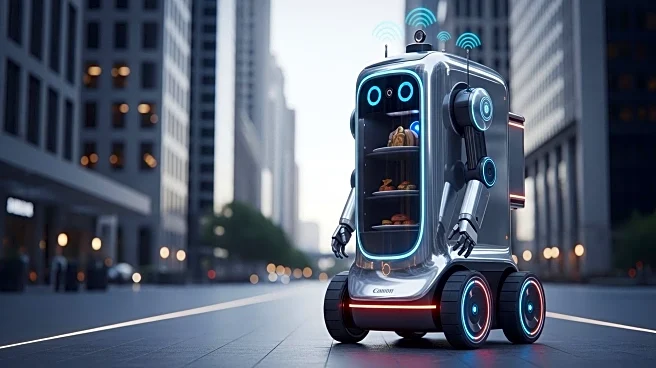What is the story about?
What's Happening?
DoorDash has launched Dot, a small autonomous robot designed to deliver food and small packages. The robot can travel on roads, bike lanes, and sidewalks at speeds up to 20 mph. Dot is currently being tested in the Phoenix metropolitan area, with plans to expand its availability to the region's 1.6 million residents by the end of 2025. The robot features a friendly design with LED eyes and a mouth that opens to reveal its cargo space. DoorDash aims to address the challenges of autonomous delivery, such as navigating the 'first and last ten feet' of delivery, by using Dot's compact size and advanced navigation technology.
Why It's Important?
Dot's introduction marks a significant advancement in the field of autonomous delivery, potentially reshaping the food delivery industry. By utilizing robots like Dot, DoorDash aims to improve delivery efficiency and reduce costs, which could benefit both consumers and local businesses. The move also highlights the increasing role of automation in everyday services, raising questions about the future of human delivery jobs. While DoorDash assures that human workers will still handle most deliveries, the long-term impact on employment remains a concern. Additionally, the use of autonomous robots could help reduce traffic congestion and emissions, contributing to environmental sustainability.
What's Next?
DoorDash plans to expand Dot's deployment beyond Phoenix, potentially introducing the robot to other major markets. The company will likely continue to refine Dot's technology and operations based on feedback from the initial testing phase. As Dot becomes more widespread, DoorDash may face regulatory challenges and public scrutiny regarding safety and job displacement. The company will need to work closely with local governments and communities to address these concerns. Additionally, DoorDash's competitors may accelerate their efforts to develop similar technologies, leading to increased competition in the autonomous delivery space.
Beyond the Headlines
The deployment of Dot could have broader implications beyond the immediate logistics industry. It may influence urban planning and infrastructure development, as cities adapt to accommodate autonomous vehicles. The technology behind Dot, including its sensor suite and AI capabilities, could also spur innovation in other sectors, such as transportation and robotics. Ethically, the shift towards automation raises questions about data privacy and the potential for increased surveillance. As companies like DoorDash continue to innovate, they must navigate these complex issues to ensure responsible and sustainable growth.















